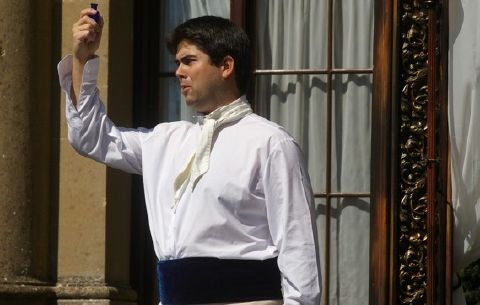|
<<< << -- 3 -- Roderic Dunnett BRILLIANTLY ENGAGING -- >> >>>

Benda sealed his German affinities with the eight years he passed, in his twenties (from 1742) in the orchestra of Frederick the Great in Berlin and Potsdam. Paris and Naples aside, training didn't come much better than that. Like Myslivecek and perhaps Vorisek, Benda was one of those Bohemian composers Mozart not only admired, but devoured and respected. In 1778 young Wolfgang saw Benda's Medea in Mannheim -- the Palatinate alternating capital (with Heidelberg) and the German world's musical Mecca (Berlin and Vienna apart) during Haydn's and Benda's day. He obtained a score, and acquired that of Benda's Ariadne too.
Mozart admired the drama of the accompanied spoken passages (both works were not so much Singspiels, like The Magic Flute, but Melodramas, with long solo scenas of chilling poignancy and intensity. 'I carry' (he told his father) 'Benda's scores around with me.' Indeed you can feel the Czech's enduring influence in the spoken passages of The Magic Flute, in Il Seraglio, and (Gray points out) in scores such as Zaide. Benda influenced others too, including Beethoven not just in his Prometheus years, but the period of first Leonora and later Fidelio as well.
It is the great scenas that are at the heart of Benda's Romeo and Juliet, and which render it, in places, a very considerable drama. There are half a dozen, which embrace a striking rage of shifting moods and doubts, yet which also confirm this opera's affinities with the essential unities and dramatic simplicity passed on by Gluck to Salieri and Mozart. Conversely, it is not a very long opera, and, to be fair, in some ways an unsatisfactory one dramatically -- unbalanced, lacking a profound libretto (the unintended comedy that surfaced here, for Capulet, for instance, rested in its ineptness) and rather too influenced by the fads, exported from London, of David Garrick and actor-managers of that period. Happy ending predictable: at the end of the opera's tomb scene these lovers recover, are blessed by chastened (enlightened?) parents and, à la Dryden, happily married.

Mark Chaundy as Romeo. Photo © 2007 Jeremy Gray
|
Curiously, the poignancy with which Juliet (the sensationally good young Portuguese-born soprano Joana Seara) cradles a white cushion, like a swaddled baby, in Act I of Jeremy Gray's serviceable production is all to do with the fact that we know (or thought we knew) that she and Romeo will never spawn one. In fact in this oddly Balfeian ending, we get the impression that a lusty, fond Romeo (tenor Mark Chaundy) will sire more than the statutory two and a half offspring upon her. The Montulets will soon be swelling in numbers.
Continue >>
Copyright © 2 September 2007
Roderic Dunnett, Coventry UK

|

